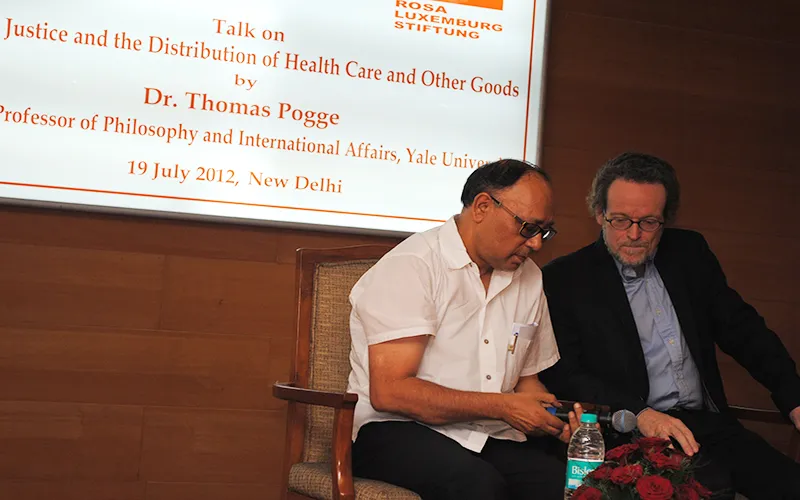Efforts are being made on a global scale to improve public health. One of the ini tiatives to attend to the many problems and challenges in the public health sect or is the creation of the Health Impact Fund (HIF).

Efforts are being made on a global scale to improve public health. One of the initiatives to attend to the many problems and challenges in the public health sector is the creation of the Health Impact Fund (HIF). Its main feature is provision of a market-based solution to problems pertaining to the development and distribution of medicines.
Some of the most important public health problems observed around the world and the role and significance of the Health Impact Fund were the main topics discussed by Prof. Thomas Pogge, Leitner Professor of Philosophy and International Affairs at Yale University, "during his talk on "Global justice and the distribution of health care and other goods". The talk was organised by Observer Research Foundation in association with the Rosa Luxemburg Stiftung (RLS) in New Delhi on 19 July 2012 under the on-going ORF-RLS Health Project.
The talk began with some insightful opening remarks by the Chair, Mr. Harsh Sethi, Consulting Editor, Seminar, the Monthly Symposium, who described the issue of health care as a topic that still lacks clarity and focus in India. He emphasised the need of knowing what the new issues are, what we need to do about them and what role can traditional health care play. All this, he stated, can guide us into planning for India’s next five year plan most efficiently. He also pointed that India has become one of the prime tertiary health care destination.
Prof. Pogge began briefly outlining the structure of his presentation. The presentation was divided into two parts. While first half of the presentation introduced the audience to the complex background of the general global problem of poverty and health, the second half of the presentation covered Health Impact Fund (HIF) project in greater details.
In the first part of the presentation, Prof. Pogge referred to some critical facts and figures related to health, poverty and development across the world. He mentioned that in many ways the statistics understate the problem of global poverty because more emphasis is laid on the lives of all those who live rather than on those who die. He supported his argument by highlighting that at least a third of human deaths across the world are due to poverty-related causes and the same causes have led to the death of at least 400 million people since the cold war. He further went on addressing the question of why does the extreme form of poverty continue to exist worldwide.
By giving the example of United States, which is the prime target for lobbying on the international arena, Prof. Pogge expanded on the role of lobbying in perpetuating global poverty. He pointed out that the main actors of the lobbying are the wealthiest banks, corporations, industry associations and individuals who aim to bring national governance upward to the global level and influence "supranational/global institutional" arrangements. He concluded the first half of the presentation by saying that the "goal to halve undernutrition over 19 years was not ambitious enough. Second, in the future we ought not to settle for anything like the MDGs which, unattached as they are to specific agents, do not merit the name "goals" at all. What we must achieve forward-going is the commitment to eradicate severe poverty completely, coupled with clear tasks and responsibilities, assigned to specific competent actors, which will keep the effort on the announced glide path".
The second part of the presentation began with the discussion of how pharmaceutical sector should be organised at both national and international level. Prof. Pogge described the present system of "Trade-Related Aspects of Intellectual Property" (TRIPS) by World Trade Organisation as failing in achieving the goal of universal access. He attributed the high price of medicine generated under this system as being the main reason for this failure.
Prof. Pogge provided a detailed assessment of TRIPS and highlighted some of the major limitations of the system. Firstly, he described that TRIPS allows innovators to fix the price of the medicine that renders poor people vulnerable twice: first for being poor and then for being poorer than the people who can afford the medicine price. The second limitation that TRIPS has stems from the fact that 90 % money goes to 10 % of total global burden of diseases. The third limitation of TRIPS is that the overall system is very inefficient and could be fixed by reducing the wastages and inefficiency. Prof. Pogge attributed the inefficiency of the present system to seven reasons: Lobbying, and gaming, patenting and litigation, wasteful marketing and counterfeiting (lower price look alikes) and huge deadweight losses.
The Health Impact Fund system, he stated, on the other hand, is a reform that will serve as a complement to the present TRIPS system. As an optional system, it will allow voluntary innovators to register new products with the HIF. Companies can either register with HIF or exploit their patent-protected mark-up privilege. After the registration, the company will be rewarded based on its contribution in reducing the global burden of diseases. If the company decides to choose HIF reward, it must give up the high mark-up reward of the present system. Prof. Pogge highlighted some of the major advantages that HIF would have over the present system of TRIPS. Firstly, it will avoid high prices by asking the innovators to sell the new medicine at the lowest feasible average cost of manufacture and distribution. Under this system, the innovator can keep intellectual property rights but must grant zero priced licenses after reward period. Here two other advantages are missing: the HIF would focus R&D attention on the more damaging diseases of the poor and it will greatly reduce the seven sources of inefficiency and waste. The HIF will also boost cost effectiveness by reducing wasteful expenditures.
Most importantly, HIF aims to improve the "last mile problems" in drug delivery. Under this system, the barriers in drug delivery will automatically become the barriers to the pharmaceutical companies from making profits. This will encourage the companies to collaborate with existing systems to ensure successful delivery of the drug. In short, HIF will ensure efficacy, affordability, promotion of high compliance and adherence, and target the patients who can benefit the most.
The talk ended with the discussion of where, when and how can HIF be adapted and merged into existing systems such as an extension of clean/green technologies and extension of agricultural innovation. Finally, the floor was open for the questions and some very interesting questions regarding the assessment of the impact, response of government, and diffusion of funds were raised. The talk concluded with a closing remark by Prof. Pogge that while HIF aims to serve as a guide towards the right direction, it certainly can’t solve everything.
The chair thanked the distinguished speaker for sharing his experiences. The contribution of the Centre for Development and Human Rights in supporting this event was acknowledged. Participants to the event included public health experts and other professionals from prominent organisations, namely NIMR, Sulabh, CRASMIB, PHFI, IGNOU, British High Commission, GIZ, and the German Embassy.
(This report is prepared by Pratibha Chauhan, Research Intern, Observer Research Foundation)
The views expressed above belong to the author(s). ORF research and analyses now available on Telegram! Click here to access our curated content — blogs, longforms and interviews.




 PREV
PREV

